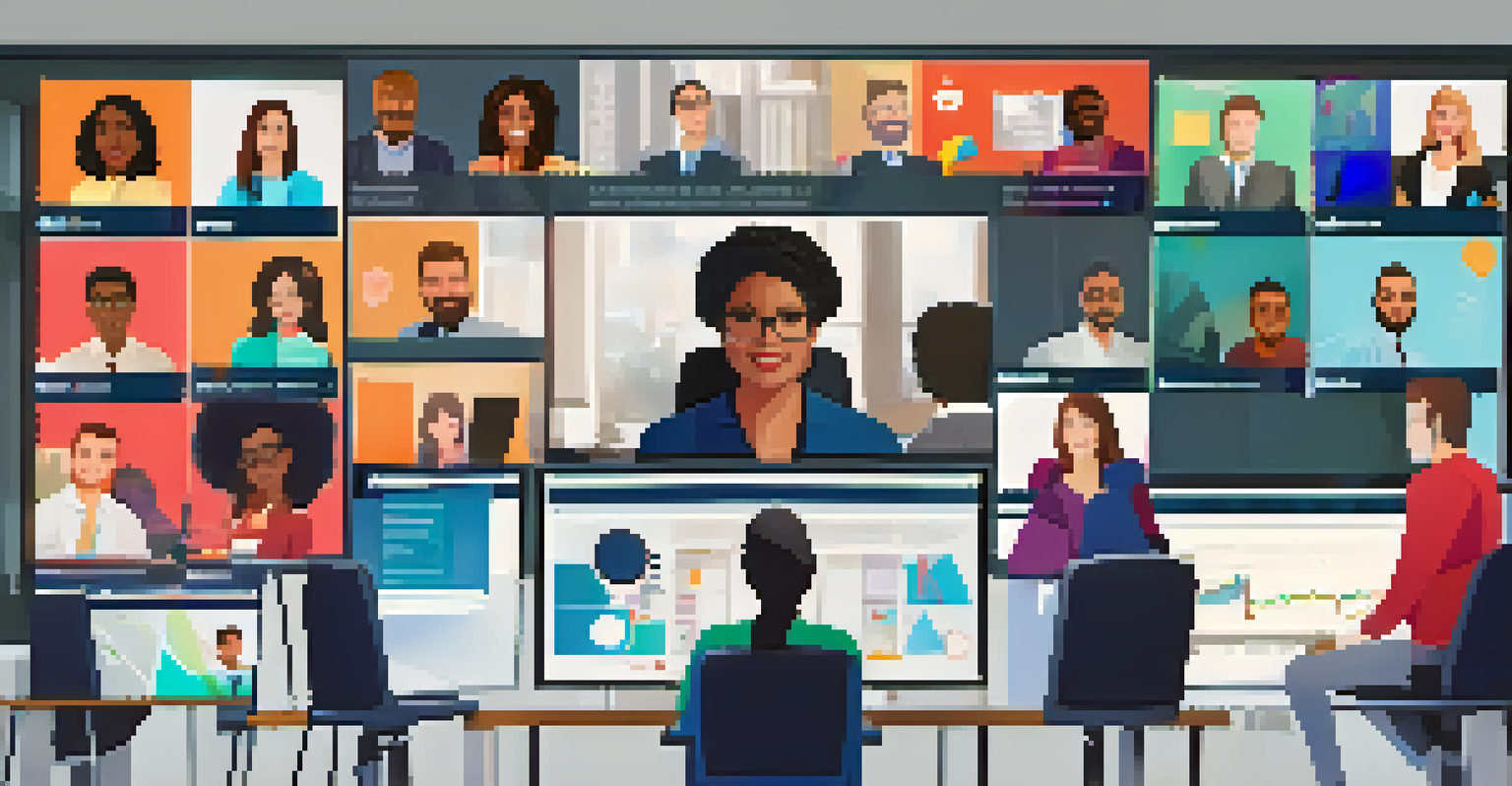The Impact of Technology on Career Adaptability Skills

Understanding Career Adaptability Skills in the Modern Workplace
Career adaptability skills refer to the ability to adjust to changing work environments and demands. In today's fast-paced world, these skills have become increasingly important as industries evolve and new technologies emerge. Think of it like a chameleon that changes its color to blend in with its surroundings; professionals must also adapt to remain relevant and thrive.
The only thing that is constant is change.
These skills include flexibility, resilience, and a willingness to learn new things. For instance, a marketing professional might need to pivot from traditional advertising methods to digital strategies as consumer behavior shifts. This adaptability ensures that employees stay competitive in their fields and can take advantage of new opportunities.
As technology continues to disrupt various sectors, the need for strong career adaptability skills is more pressing than ever. Workers who embrace change and are open to learning will likely find success, while those resistant to change may struggle to keep up. Ultimately, adaptability is no longer just a nice-to-have; it's a crucial component of career sustainability.
How Technology Facilitates Skill Development and Learning
Technology has revolutionized the way we learn and develop skills needed for our careers. Online courses, webinars, and interactive platforms provide accessible resources for anyone looking to enhance their knowledge. For example, platforms like Coursera and Udemy offer a plethora of courses that cater to diverse interests and industries, making continuous learning more achievable.

Moreover, technology enables personalized learning experiences. With artificial intelligence and machine learning, training programs can adapt to individual needs, helping people focus on areas where they need the most improvement. This tailored approach not only enhances learning efficiency but also boosts confidence among learners.
Adaptability is Key in Careers
Professionals must develop adaptability skills to remain competitive in an ever-evolving job market.
Additionally, the rise of virtual reality (VR) and augmented reality (AR) is transforming practical skill training. For instance, VR simulations can provide real-world experiences in a risk-free environment, which is especially beneficial in fields like medicine and engineering. By leveraging these technologies, professionals can gain hands-on experience and develop adaptability skills that are essential for their careers.
The Role of Networking Platforms in Career Growth
Networking has always been a fundamental aspect of career development, and technology has taken it to new heights. Platforms like LinkedIn enable professionals to connect with others in their industry, share insights, and discover opportunities. This digital networking can lead to mentorships, collaborations, and job offers that might not have been possible otherwise.
In a world where change is the only constant, the best way to thrive is to adapt.
These platforms also provide valuable resources for skill enhancement, including articles, webinars, and discussions. Engaging with industry leaders and peers helps individuals stay informed about the latest trends and skills required in their field. This knowledge allows them to adapt and evolve alongside their industry.
Furthermore, the ability to showcase one's skills and achievements online enhances visibility. Job seekers can highlight their adaptability and continuous learning efforts through endorsements and recommendations. This digital footprint not only aids in career advancement but also reinforces the importance of adaptability in a technology-driven job market.
Remote Work: A Catalyst for Career Adaptability Skills
The shift toward remote work has underscored the importance of adaptability in our careers. With teams dispersed across various locations, professionals must learn to navigate new tools and communication methods. This transition requires flexibility and the ability to quickly adjust to different work environments, making adaptability skills even more essential.
Moreover, remote work can enhance time management and self-discipline, as individuals are responsible for their productivity. Adapting to this new way of working often means developing new routines and utilizing technology to stay organized. For instance, tools like Asana and Trello can help manage tasks effectively, creating a structure that supports adaptability.
Technology Enhances Learning
Digital tools and platforms facilitate continuous learning, making it easier for individuals to upgrade their skills.
Additionally, the remote work model fosters a culture of continuous learning. Professionals are often encouraged to seek out online resources and training opportunities to enhance their skills. This proactive approach not only helps individuals adapt to their current roles but also prepares them for future career advancements in an ever-evolving job landscape.
Artificial Intelligence: Transforming Skill Requirements
Artificial intelligence (AI) is reshaping job roles and the skills required to perform them. As AI systems take over routine tasks, there's a growing demand for skills that machines cannot replicate, such as critical thinking and emotional intelligence. This shift necessitates that professionals adapt and focus on developing these uniquely human skills.
Furthermore, AI tools can aid in skill assessment and development. For example, organizations can use AI-driven analytics to identify skill gaps in their teams and provide targeted training to bridge those gaps. This enables employees to adapt to the changing skill landscape effectively, ensuring they remain valuable assets to their organizations.
As AI continues to advance, the importance of adaptability in learning new technologies will only increase. Workers must be willing to embrace AI solutions, learning how to work alongside these tools rather than fearing them. This mindset not only enhances individual career growth but also contributes to a more innovative and adaptive workforce.
The Importance of Lifelong Learning in Career Adaptability
In an era where change is the only constant, lifelong learning has become a necessity for career adaptability. Professionals must continuously seek opportunities to update their skills and knowledge to stay relevant in their fields. This commitment to learning empowers individuals to navigate shifts in their industries with confidence.
Technology plays a crucial role in facilitating lifelong learning. With the advent of e-learning platforms and mobile apps, individuals can learn at their own pace and on their own schedule. For example, a busy professional can take a short course during their commute, making it easier to fit learning into a hectic lifestyle.
Networking Fuels Career Growth
Leveraging networking platforms helps professionals connect, share insights, and discover new opportunities.
Moreover, fostering a mindset of curiosity and openness to new ideas will enhance adaptability skills. By embracing new challenges and seeking feedback, individuals can build resilience and become more adept at handling change. Lifelong learning is not just about acquiring new information; it's about cultivating an adaptable mindset that can thrive in any professional environment.
Conclusion: Embracing Technology for Career Success
In conclusion, technology has a profound impact on career adaptability skills, shaping how we learn, connect, and grow. By leveraging digital tools and resources, professionals can enhance their adaptability, ensuring they remain competitive in a rapidly changing job market. Embracing technology is not just about keeping up; it's about thriving in an environment where change is the norm.
The ability to adapt is increasingly linked to success in one's career. As we navigate new technologies and work arrangements, the skills we develop today will define our professional journeys tomorrow. Taking advantage of online learning, networking, and new tools can empower individuals to take control of their career paths.

Ultimately, embracing technology and cultivating adaptability skills will lead to a more resilient workforce. As we move forward, it's essential to remain open to change and continuously seek growth opportunities, ensuring that we are always prepared for whatever the future holds.